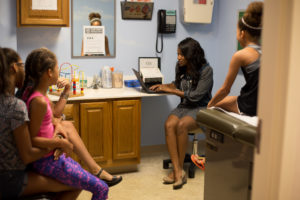
28 Sep Should your Child’s Doctor be your BFF?
The Doctor-Patient relationship has unique meaning in the world of pediatrics. Your pediatrician is a highly educated consultant that helps you navigate this crazy ride called parenthood. Discussions ranging from toddler poop frequency to teenage questions about puberty are inevitable, so let’s pull up a seat and get cozy.
For many, the Doctor-Patient Relationship has developed into more of a partnership than a paternalistic relationship over recent years. Studies have shown that patients receive the best care when they work in collaboration with their doctors. If your family has a continuing relationship with your child’s doc, it gives you the comfort to go deeper into issues. By improving the relationship with your child’s doctor, you will be better equipped to control their quality of life and health outcomes.
As with any relationship, good communication is a two-way street. It is your pediatrician’s job to make you and your child feel comfortable and to educate you on normal development and growth as well as disease processes. But it is best if you let your child’s doctor know you trust her to make decisions based on the best interest of your child, not what is easier for you or what makes you feel better.

Here are a few tips to help find the right BFF… I mean physician!
Find Your Match: Collect recommendations from family, friends and co-workers. If they have an established relationship, they have already done the research and hopefully love their doc.
Meet with the pediatricians you like on paper, face-to-face. Meeting in person will give you an understanding of the office culture and a chance to see if the location and staff are a good fit for you. Meeting in person will also help you decide if you have the right chemistry to build this important relationship.
Transparency is Key: Transparency in healthcare is not the same as over sharing. Issues you and your family share are going to be personal, and in order to build trust and address these problems, be open and honest about them. From a physician’s standpoint, it is much easier when parents tell me what is worrying them, even if it seems silly or minute.
Know When to Say Goodbye: You’re a rock star parent. She’s probably a top-notch pediatrician. But sometimes things just don’t go as smoothly as planned. While it is okay to disagree with your child’s doctor, if your core beliefs about medicine differ, you are probably not the right match. Give the relationship a few visits before you decide on parting ways. If the breakup was caused by something the office may be able to rectify, such as long wait times, be sure to give them the friendly feedback. Otherwise, as Boyz II Men so eloquently sang, know when you have come to the End of the Road.

